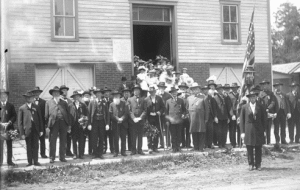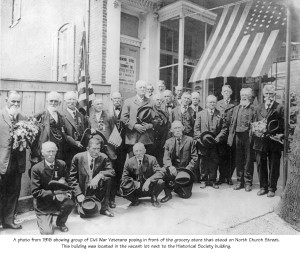by Jim Houck, Jr.
Francis X. Elder Gets a New Head Stone
Roger Melton, president of the Board of Directors Francis X. Elder American Legion Post 121 Emmitsburg, said that while he was at the 2014 Veterans Day volley by our American Legion and VFW combined Color Guard, over the grave of Francis X. Elder, he noticed that the scrolling and letters on the headstone marking the grave were barely legible. Francis X. Elder, for those that don’t know, was the first soldier from World War I from Emmitsburg to be killed in action.
Melton was very concerned, because Francis X. Elder was a hero and the namesake of our post, so he decided that this was something that needed to be brought up and discussed by members at our regular meeting (held the first Tuesday of each month at 7:00 p.m.) to discuss what needs to be done. Meeting night, Roger brought it to the attention of the membership and everyone was in agreement that the headstone needed to be replaced. Funds were appropriated for the project and it was put out for bid. Jeff Zumbrun, the owner of Zumbrun’s Funeral Home, won the bid.
Roger called me and asked if I would like to do a story on the replacement and what was happening to the original headstone and I said I certainly would like that. I, after all, had done a few stories on Francis X. Elder and even had one of them go national on the National Sons of AMVETS Website and National Sons of AMVETS Newsletter. I have a collection of newspaper articles given to me by Ralph Ireland from a collection his mother left when she passed away. I am very interested in anything about Francis X. Elder. I followed the replacement from the beginning and I even took several photos of the entire replacement which will follow this article.
I met Jeff Zumbrun and his son Jim on the day they came to start the replacement project. They are both gentlemen who work very hard at what they do and are not afraid of hard work, and believe me what they do is hard work. They do not use machines to move these monuments around, just manual labor and levers, the old fashioned ways. Jeff’s son Jim, is taking classes to become an undertaker and said that he is doing this to help his dad and plans on continuing the family business.
I interviewed Jeff after all was completed and he said, “My name is Jeff Zumbrun and I have a funeral home in Eldersburg, Carroll County Maryland and I am here with my son, Jim, who is hopefully going to take up the business. We got into the monument business when we first started to plan for the funeral home because it was much easier to get started. We got this connection in Emmitsburg when we bid on the headstone replacement when Roger Melton called and said we won the bid. I initially put in the bid because my brother was killed in Vietnam and I somehow felt it would be sort of a tribute to him by doing this.”
Jeff said that next year will be their twentieth anniversary of starting the business. He said they started their business from scratch and that it wasn’t an old guy that retired or anything like that. They just decided to go into business for themselves and he said by the Grace of God and community support they have been able to continue the business for going on twenty years.
The original headstone has been placed beside the World War II Memorial in front of the Francis X. Elder American Legion Post and looks very nice with the Korean War and Vietnam War Monuments and the Cannon.
God Bless America, God Bless the American Veteran, and God Bless You.
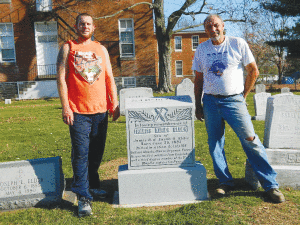
Pictured are Jeff Zumbrun and his son, Jim.

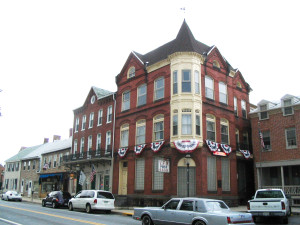 You are eligible to be a member of any VFW (Veterans of Foreign Wars) Men’s Auxiliary if you are a man over the age of sixteen, a citizen of the United States, and are a husband, widower, father, son, grandson, brother, foster brother, step brother, foster son, or step son of persons who were or are eligible for membership in the Veterans of Foreign Wars of the United States. The very first thing you should know—and I will attest to—is that these organizations are not formed just for a cheap drinking establishment; we are comrades in aiding our parent organization, the VFW, our Veterans and our community families. We have standing committees for membership, relief, publicity, youth activities, Americanism, community activities, and safety. We have fundraising functions and urge everyone to volunteer their time and expertise to make the events enjoyable, as well as profitable. We have as our objective to promote Americanism by means of education in patriotism and constructive service to local communities.
You are eligible to be a member of any VFW (Veterans of Foreign Wars) Men’s Auxiliary if you are a man over the age of sixteen, a citizen of the United States, and are a husband, widower, father, son, grandson, brother, foster brother, step brother, foster son, or step son of persons who were or are eligible for membership in the Veterans of Foreign Wars of the United States. The very first thing you should know—and I will attest to—is that these organizations are not formed just for a cheap drinking establishment; we are comrades in aiding our parent organization, the VFW, our Veterans and our community families. We have standing committees for membership, relief, publicity, youth activities, Americanism, community activities, and safety. We have fundraising functions and urge everyone to volunteer their time and expertise to make the events enjoyable, as well as profitable. We have as our objective to promote Americanism by means of education in patriotism and constructive service to local communities.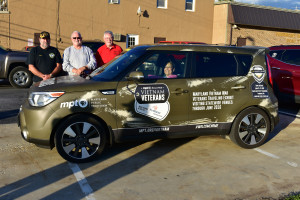
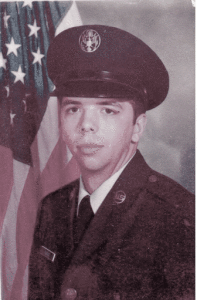 STAFF SERGEANT RICHARD L. FLEAGLE U.S. AIR FORCE RETIRED
STAFF SERGEANT RICHARD L. FLEAGLE U.S. AIR FORCE RETIRED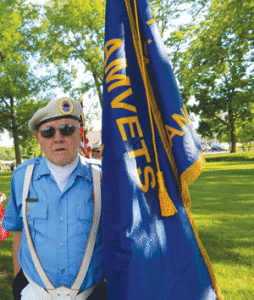 Richard W. Fleagle (Dick) was five days old when Pearl Harbor was bombed by the Japanese, and Dick jokingly says he saw the planes go over but he couldn’t talk yet to warn anyone. On December 2, 1941 George Albert and Amelia Fleagle had a bouncing baby boy at their home and they named him Richard Warren. Dick’s parents raised him in Thurmont and sent him and his two sisters, Shirley and Georgette, to the Thurmont school system where he played sports, participated in a lot of school plays, and sang in the school glee club. He remembers one play when he played a monkey and dressed in a monkey suit. He would sit on people’s laps and jump around and he could be silly because no one knew who he was. Dick said he started getting interested in girls when he was a junior in high school and chased a variety of them. He took one of them to the prom and stayed out all night with her. He said he won a door prize at the prom and when he opened the package it was a large bottle of hair tonic. Dick thought it was to slick his hair down, but when he used it, his hair fell out and he was bald by age twenty-two. So, now we know the rest of that story.
Richard W. Fleagle (Dick) was five days old when Pearl Harbor was bombed by the Japanese, and Dick jokingly says he saw the planes go over but he couldn’t talk yet to warn anyone. On December 2, 1941 George Albert and Amelia Fleagle had a bouncing baby boy at their home and they named him Richard Warren. Dick’s parents raised him in Thurmont and sent him and his two sisters, Shirley and Georgette, to the Thurmont school system where he played sports, participated in a lot of school plays, and sang in the school glee club. He remembers one play when he played a monkey and dressed in a monkey suit. He would sit on people’s laps and jump around and he could be silly because no one knew who he was. Dick said he started getting interested in girls when he was a junior in high school and chased a variety of them. He took one of them to the prom and stayed out all night with her. He said he won a door prize at the prom and when he opened the package it was a large bottle of hair tonic. Dick thought it was to slick his hair down, but when he used it, his hair fell out and he was bald by age twenty-two. So, now we know the rest of that story. 